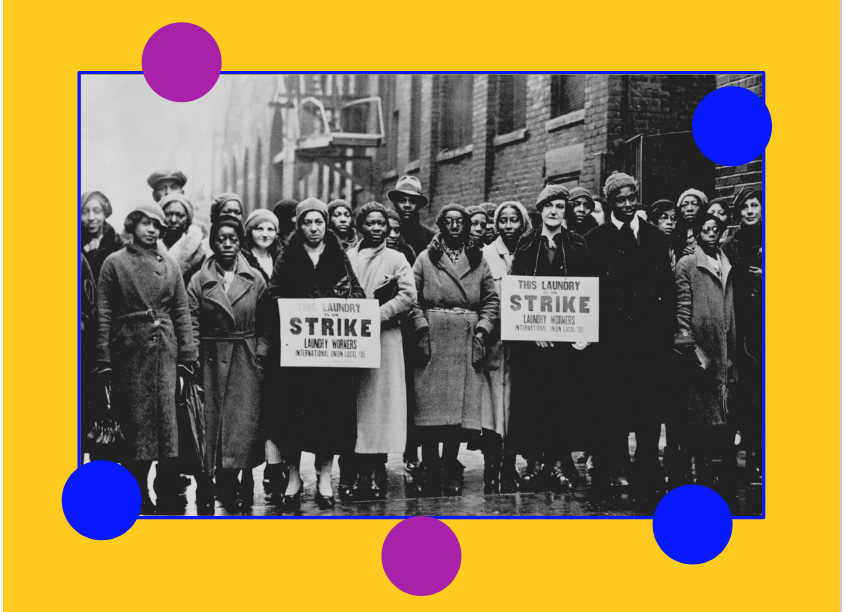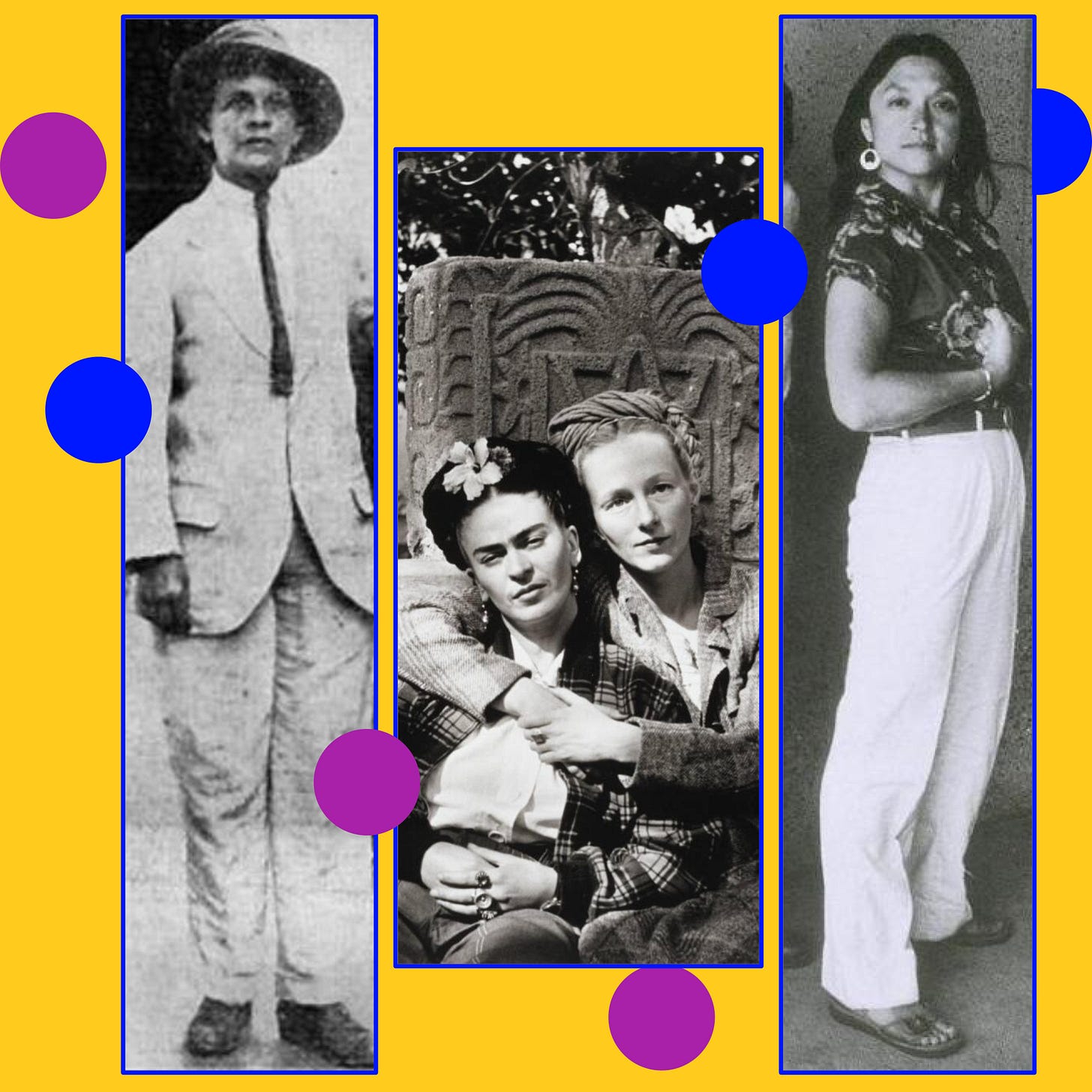"¡Querer es poder! / Wanting is doing!"
Exploring the links between feminist literature and labor history as #HotLaborSummer transitions to autumn
Happy Labor Day! 2023 has brought another summer of history-making labor actions across industries and around the world. The latest landmark strikes related to cultural production show no sign of ending soon, bringing with them questions about compensation, AI, and ownership over creative work that will impact artists and writers working beyond the film industry.
The history of feminist literature is inextricably linked with the labor movement in the United States and elsewhere. This month we’ve compiled free online resources for exploring and celebrating this history, and highlighted a few of the writers and artists who have helped shape it.

A celebrated children’s author, novelist, and Ann Bradstreet biographer, Helen Stuart Campbell also wrote a series of deeply influential texts about women working outside the home that are in the public domain and available to all. Her 1893 monograph Women Wage-Earners, considered the first formal study of women workers in the US, developed from a Good Housekeeping article. She went on to pen a series of papers—Prisoners of Poverty: Women Wage-Workers, Their Trades and Their Lives—that sparked widespread inquiry into the conditions of New York City working women, ultimately leading to significant labor reforms.
The Pauli Murray Center for History and Justice is based in Durham, NC, at the childhood home of legal scholar, activist, poet, and labor organizer Rev. Dr. Pauli Murray and offers many virtual events and resources to carry on their legacy and inspire further activism. The Center’s site shares links to several of Rev. Dr. Murray’s writings and offers free curricula, workshop guides, and more.
Prior to hir death the endlessly pioneering writer, scholar, and labor activist Leslie Feinberg made the 20th anniversary edition of hir classic novel Stone Butch Blues free to all. “I give this novel back to the workers and oppressed of the world.” You can also read Feinberg’s column on the the relationship between class and LGBTQ+ history at Worker’s World.
Looking for a playlist for the long weekend? Kim Kelly, author of FIGHT LIKE HELL: The Untold History of American Labor, put one together from the Smithsonian Folkways catalog. Her accompanying essay shares context behind the selections and links to related reading.
Quick online literary reads:
Tillie Olsen, “I Stand Here Ironing” (1961) [Short Story Project]
Nellie Wong, “Typing the Menu” [Big Bridge, An Anthology of Bay Area Women Writers]
Rhina P. Espaillat, “Find Work” [Poetry]

Cita Canon Spotlight
While working as lectora reading newspapers to workers in Puerto Rico’s tobacco factories, Luisa Capetillo (1879-1922) became a leader in Federación Libre de Trabajadores (Free Federation of Workers). She helped organize and promote strikes and demonstrations aimed at improving conditions for the island’s workers. She authored the first feminist treatise published in Puerto Rico, Mi opinión sobre las libertades, derechos y deberes de la mujer (A Nation of Women), along with several other books of essays arguing for women’s and workers’ rights. [Further reading from the Library of Congress and Lux.]
Emmy Lou Packard (1914-1988) was a muralist, painter, and printmaker who was active in many labor iniatives. Though she most famously served as her friend Diego Rivera’s principal assistant on the Pan American Unity mural (1940), Packard also restored the WPA-era murals in Coit Tower in San Francisco alongside Dorothy Wagner Puccinelli, and was the technical advisor to los tres muralistas for their iconic 1974 mural at Bank of America in the Mission District. She co-founded the Artists Equity artists’ union, played a major role in the Graphic Arts Workshop at the California Labor School (where she made works illustrating union histories), and worked as a time for a shipyard newspaper as an illustrator. [Read about a recent exhibition of Packard’s work at People’s World.]
Poet, professor, and activist Merle Woo (b. 1941) was a member of the feminist performance collective Unbound Feet, whose work challenged sexism, racism, and stereotypes about Chinese women. She was fired from her teaching position at University of California, Berkeley, in 1982 after publicly criticizing the institution’s approach to its Ethnic Studies department. She was reinstated after fighting back with support from the Merle Woo Defense Committee (feat. Angela Davis, Gloria Steinem, and many others), but her contract was not renewed in 1986. She worked with her union to file a grievance and was ultimately successful, setting a lasting precedent for free speech and gender discrimination on campus. [More on Woo’s case against Berkeley via the Freedom Socialist Party.]
“Lo esencial es llevarla á la práctica. ¡Empezar! Lo demás, es debilidad, y un concepto errado del poder humano. ¡Querer es poder!”
"What is essential is that the idea be put into practice. Begin! The rest is weakness and an erroneous concept of human power. Wanting is doing!"
—Luisa Capetillo, Mi opinión sobre las libertades, derechos y deberes de la mujer/A Nation of Women (1911) (translation by Alan West-Durán for Arte Público Press)
Further Reading
Offline bonus! Places of Pan-American Feminism and Labor Rights [National Park Service]
Justice for All: The Womanist Labor Rhetoric of Nannie Helen Burroughs (who was also a playwright!) [Coalition of Feminist Scholars in the History of Rhetoric and Composition]
If “Labor Is Entitled to All It Creates,” Where Does That Leave Graphic Design?
[AIGA Eye on Design]
Stay tuned for news about our new digital book formats (❗) and our NEXT BOOK! Coming soon…
Do you have recommendations for topics to cover or resources to include in this newsletter? Write to us: info@citapress.org.




